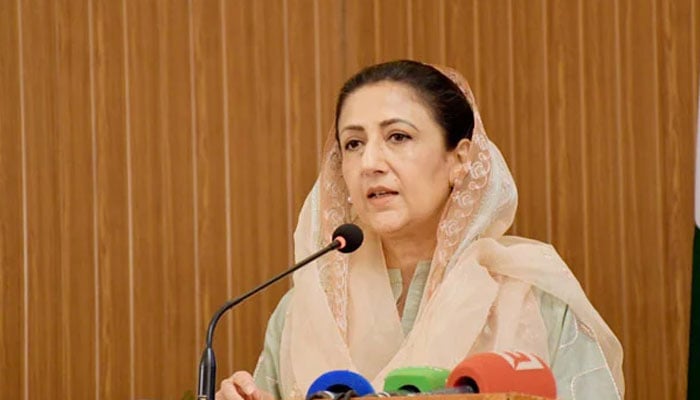‘Fiscal year 2025-26 budget to be first climate budget’
Islamabad:Dr Shezra Mansab Ali Khan Kharal, Minister of State for Climate Change and Environmental Coordination, has announced that budget for the fiscal year 2025-26 will be Pakistan’s first climate-focused budget subjecting 30% of all public development projects to undergo a Climate Public Investment Management Assessment (CPIMA, marking a significant shift towards incorporating climate considerations into national economic planning.
Dr Shezra was addressing a Pre-Budget Dialogue on “Rethinking economic policy for a just energy transition” organised by Sustainable Development Policy Institute (SDPI) in collaboration with Policy Research Institute for Equitable Development (PRIED) here Tuesday. Dr Shezra highlighted the multifaceted challenges Pakistan faces, including increased vulnerability to climatic risks affecting agriculture, India's suspension of Indus Water Treaty exacerbating water scarcity and the constraints imposed by the IMF’s austerity programme limiting development expenditures. She noted that the energy sector's inefficiencies and circular debt continue to strain the national budget necessitating a transition to sustainable energy solutions.
Sanaullah Baloch, MPA from Balochistan, argued that the ongoing insurgency and conflict in his province are rooted in the unjust distribution of its resources. He recalled that Pakistan was among only five countries in the world that discovered natural gas in 1955, and Balochistan’s gas contributed to $200 billion in value. He asserted that the industrial revolution across Pakistan was driven by Balochistan’s gas, likening energy to the bloodstream of a nation. He lamented the lack of energy access in Balochistan, which hampers development, with only 20% grid access compared to Punjab's 95%, Sindh's 85%, and KP's 80%.
Dr Abid Qaiyum Suleri, Executive Director, SDPI, emphasised the economic imperatives driving the energy transition. He pointed out that rising fuel prices and the liberalisation of the second-hand automobile market could accelerate the adoption of hybrid and electric vehicles, thereby promoting energy efficiency and reducing dependence on fossil fuels.
Shahid Hafeez Kardar, former Governor, State Bank of Pakistan, stressed the need for economic policies that prioritise long-term sustainability over short-term stabilisation. He advocated for shifting from reactive subsidies to proactive investments, including the use of green bonds and performance-based incentives to finance climate initiatives.
Khalid Mansoor, former Special Assistant to the Prime Minister on CPEC Affairs, highlighted the transformational phase of CPEC, focusing on energy transition, smart agriculture, value-added textiles and digital transformation. He emphasised the importance of tripartite collaboration involving Pakistan's private sector, international investors and China to synchronise capital across multiple domains.
Senior economist Dr Khaqqan Najee stressed that energy issues in Pakistan are rooted in governance and management challenges rather than just energy costs or inefficiencies. He called for a unified and authoritative energy regulator to develop a competitive energy market and harmonise climate budgeting to create greater fiscal space.
Economist Afia Malik cautioned that petroleum levies directly impact the poor suggesting that carbon taxes on emitting energy sources would transfer the burden to final consumers including the middle class. She stressed the need for equitable fiscal policies that do not disproportionately affect vulnerable populations.
-
 Jelly Roll Explains Living With 'severe Depression'
Jelly Roll Explains Living With 'severe Depression' -
 Charli XCX Applauds Dave Grohl’s 'abstract' Spin On Viral ‘Apple’ Dance
Charli XCX Applauds Dave Grohl’s 'abstract' Spin On Viral ‘Apple’ Dance -
 Anna Sawai Opens Up On Portraying Yoko Ono In Beatles Film Series
Anna Sawai Opens Up On Portraying Yoko Ono In Beatles Film Series -
 Eric Dane's Wife Rebecca Gayheart Shares Family Memories Of Late Actor After ALS Death
Eric Dane's Wife Rebecca Gayheart Shares Family Memories Of Late Actor After ALS Death -
 Palace Wants To ‘draw A Line’ Under Andrew Issue: ‘Tried And Convicted’
Palace Wants To ‘draw A Line’ Under Andrew Issue: ‘Tried And Convicted’ -
 Eric Dane's Girlfriend Janell Shirtcliff Pays Him Emotional Tribute After ALS Death
Eric Dane's Girlfriend Janell Shirtcliff Pays Him Emotional Tribute After ALS Death -
 King Charles Faces ‘stuff Of The Nightmares’ Over Jarring Issue
King Charles Faces ‘stuff Of The Nightmares’ Over Jarring Issue -
 Sarah Ferguson Has ‘no Remorse’ Over Jeffrey Epstein Friendship
Sarah Ferguson Has ‘no Remorse’ Over Jeffrey Epstein Friendship -
 A$AP Rocky Throws Rihanna Surprise Birthday Dinner On Turning 38
A$AP Rocky Throws Rihanna Surprise Birthday Dinner On Turning 38 -
 Andrew Jokes In Hold As BAFTA Welcomes Prince William
Andrew Jokes In Hold As BAFTA Welcomes Prince William -
 Sam Levinson Donates $27K To Eric Dane Family Fund After Actor’s Death
Sam Levinson Donates $27K To Eric Dane Family Fund After Actor’s Death -
 Savannah Guthrie Mother Case: Police Block Activist Mom Group Efforts To Search For Missing Nancy Over Permission Row
Savannah Guthrie Mother Case: Police Block Activist Mom Group Efforts To Search For Missing Nancy Over Permission Row -
 Dove Cameron Calls '56 Days' Casting 'Hollywood Fever Dream'
Dove Cameron Calls '56 Days' Casting 'Hollywood Fever Dream' -
 Prince William, Kate Middleton ‘carrying Weight’ Of Reputation In Epstein Scandal
Prince William, Kate Middleton ‘carrying Weight’ Of Reputation In Epstein Scandal -
 Timothée Chalamet Compares 'Dune: Part Three' With Iconic Films 'Interstellar', 'The Dark Knight' & 'Apocalypse Now'
Timothée Chalamet Compares 'Dune: Part Three' With Iconic Films 'Interstellar', 'The Dark Knight' & 'Apocalypse Now' -
 Little Mix Star Leigh-Anne Pinnock Talks About Protecting Her Children From Social Media
Little Mix Star Leigh-Anne Pinnock Talks About Protecting Her Children From Social Media




